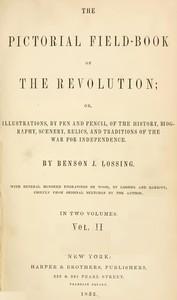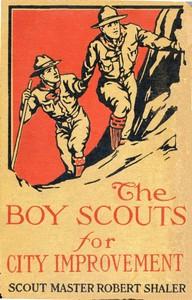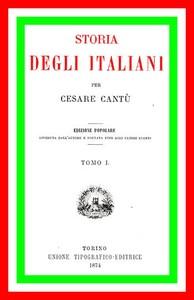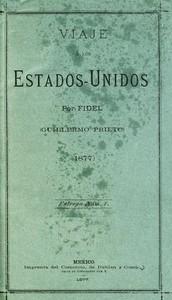Read this ebook for free! No credit card needed, absolutely nothing to pay.
Words: 363484 in 94 pages
This is an ebook sharing website. You can read the uploaded ebooks for free here. No credit cards needed, nothing to pay. If you want to own a digital copy of the ebook, or want to read offline with your favorite ebook-reader, then you can choose to buy and download the ebook.


: The Pictorial Field-Book of the Revolution Vol. 2 (of 2) or Illustrations by Pen And Pencil of the History Biography Scenery Relics and Traditions of the War for Independence by Lossing Benson John - United States History Revolution 1775-1783
ould they still persist in refusing obedience, they were menaced with all the extremes of war. Packages of these manifestoes, with one printed on vellum, and signed by Clinton, Carlisle, and Eden, were made up to be sent to Congress and the several states by a flag. Congress declared that the agents employed to distribute them were not entitled to the protection of a flag, and recommended the states to seize and imprison them, Congress also published a manifesto, which, after charging commissioners with mean attempts to bribe members of its body and other persons, with deceit and servility of adulation, they concluded by solemnly declaring, "If our enemies presume to execute their threats, or persist in their present career vengeance as shall deter others from like conduct.
We appeal to that God who searcheth the hearts of men for the rectitude of our intentions; and in his holy presence declare, that, as we are not moved by any light and hasty suggestions of anger or revenge, so, through every possible change of fortune, we will adhere to this our determination."
"No single art engaged his manly mind, In every scene his active genius shined. Nature in him, in honor to our age,
Behold, at Briton's utmost shifts Comes Johnstone, loaded with like gifts, To venture through the Whiggish tribe, To cuddle, wheedle, coax, and bribe; And call, to aid his desp'rate mission, His petticoated politician: "Firm to his purpose, vigilant and bold, Detesting traitors, and despising gold, He scorn'd all bribes from Britain's hostile throne, For all his country's wrongs were thrice his own."
"While Venus, join'd to act the farce, Strolls forth embassadress of Mars. In vain he strives; for while he lingers, These mastiffs bite his off ring fingers; Nor buys for George and realms infernal One spaniel but the mongrel Arnold."
The weather was intensely hot, which circumstance, in connection with a heavy storm that commenced about nine in the morning, made it impossible to resume the march without injury to the troops.
Early on the morning of the 27th, La Fayette, with the advanced forces, proceeded to Englishtown, a hamlet about five miles westward of Monmouth court-house. Sir Henry Clinton was advised of the movements of the Americans, and, properly apprehending an attack upon his flanks and rear, changed the disposition of his line. He placed the baggage train in front, and his best troops, consisting of the grenadiers, light infantry, and chasseurs of the line, in the rear. The baggage of the whole army was placed under the charge of General Knyphausen. With his army thus arranged, Clinton encamped in a strong position near Monmouth court-house, secured on nearly all sides by woods and marshy grounds. His line extended, on the right, about a mile and a half beyond the court-house to the parting of the roads leading to Shrewsbury and Middletown, and on the left, along the road from Monmouth to Allentown, about three miles.
Dickinson, menaced their left. Washington foresaw the increased strength the enemy would gain by reaching the heights of Middletown, which were about three miles in advance. To prevent them obtaining that advantage, he determined to attack their rear the moment they should attempt to move. For this purpose he ordered General Lee to make the necessary disposition, and to keep his troops in readiness to move at the shortest notice. Sir Henry Clinton, perceiving that an immediate action was inevitable, made preparations accordingly. The night of the 27th was one of great anxiety to both parties.
The 28th of June, 1778, a day memorable in the annals of the Revolution, was the Christian Sabbath. The sky was cloudless over the plains of Monmouth when the morning dawned, and the sun came up with all the fervor of the summer solstice. It was the sultriest day of the year; not a zephyr moved the leaves; nature smiled in her beautiful garments of flowers and foliage, and the birds carolled with delight, in the fullness of love and harmony. Man alone was the discordant note in the universal melody. He alone, the proud "lord of creation," claiming for his race the sole mundane possession of the Divine image, disturbed the chaste worship of the hour, which ascended audibly from the groves, the streams, the meadows, and the woodlands. On that calm Sabbath morning, in the midst of paradisal beauty, twenty thousand men girded on the implements of hellish war to maim and destroy each other--to sully the green grass and fragrant flowers with human blood!
of the meeting-house, to secure a particular road, he pushed forward, with his staff, across the morass, at a narrow causeway near the parsonage indicated by an oblong upon the stream toward the left of the plan, and joined Dickinson upon the height.
There conflicting intelligence was brought to him. At one moment it was asserted that the enemy had moved off with precipitation, leaving only a covering party behind; at another, that the whole army was filing off to the right and left to attack the Americans. While he was endeavoring to obtain reliable information on which to predicate orders, La Fayette arrived at the head of the main body of the advanced corps.
Having satisfied himself that no important force of the enemy was upon either flank, Lee determined to march on. His whole command now amounted to about four thousand troops, exclusive of Morgan's corps and the Jersey militia. The broken country was heavily wooded to the verge of the plain of Monmouth. Under cover of the forest, Lee pressed forward until near the open fields, when he formed a portion of his line for action, and, with Wayne and others, rode forward to reconnoiter. From observations and intelligence, he concluded that the column of the British army which he saw deploying on the left were only a covering party of about two thousand men; and entertaining hopes that he might succeed in cutting them off from the main army, he maneuvered accordingly. Wayne was detached, with seven hundred men and two pieces of artillery, to attack the covering party in the rear; not, however, with sufficient vigor to cause them to retreat to the main body. Meanwhile Lee, with a stronger force, endeavored, by a short road leading to the left, to gain the front of the party. Small detachments were concealed in the woods, at different points on the enemy's flanks, to annoy them.
Free books android app tbrJar TBR JAR Read Free books online gutenberg
More posts by @FreeBooks

: The Boy Scouts for City Improvement by Shaler Robert - Mystery and detective stories; Boy Scouts of America Juvenile fiction; Civic improvement Juvenile fiction; Urban beautification Juvenile fiction








